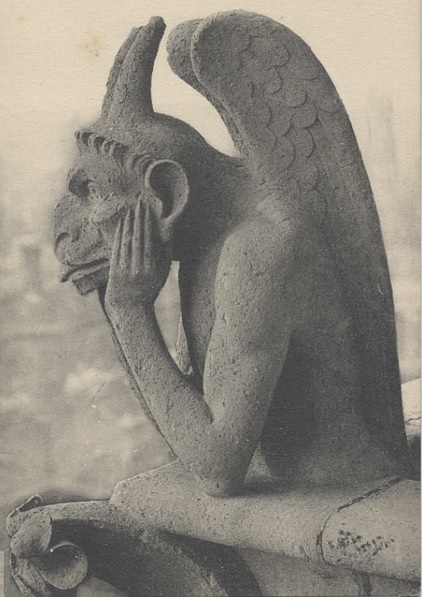“Do not let your hearts be troubled and do not be afraid.” John 14:27
We all approach life from a certain world view. And while the dictators of politically correct doctrine decry bias as a bad thing, it’s really just a realistic thing.

No matter how much pressure is placed upon us by the mass media, political structure, and academic establishment, we are not all going to think alike: some of us will insist upon putting butter, not margarine, on our potatoes. And while the margarine lovers may quaver in outrage at this, contending — with the full support of experts — that if the butter people continue to have their way, all sorts of hate crimes will result, anarchy will reign, and the planet will implode, diners do have the right to personal taste preferences.
So there’s nothing wrong with bias, or world-view, perspective, or proclivity, and a wise person is in touch with what he believes, and why.
(How we believe is not fixed and permanent, incidentally: the thoughts we had on Santa Claus, for example, in our childhood probably differ from those we have as an adult, and thinking people do just that: we think, and read, and ponder, and adjust our world view as we gain knowledge and wisdom.)
Our Christian World-View — How Much “World” in That View?
So it is with our Christian walk — as we think, and read, and ponder; pray, and meditate, and question — we learn more about our Father in heaven, and we adjust the way we respond and live by the knowledge and wisdom we gain.
When I was a child in Christ — a childhood that lasted more than 20 years, I’m afraid — I spent little time thinking about, or talking to, my Father in heaven, because I was convinced that He wasn’t a particularly nice person. Like many people who really don’t read the Bible but depend upon others to interpret it for them, I saw God — especially the God of the Old Testament — as impatient, unforgiving, irritable, petulant, controlling, random, and unpredictable.

Of course, I knew (because I was constantly told, but not shown, this) that He was loving and forgiving, but this was in concomitance with all of the attributes above, which meant that, though I was forgiven, I was not necessarily embraced. And while God wouldn’t toss me into hell when I thought an uncharitable thought, or worse, employed a four-letter word that began with the 6th letter of the alphabet, He would turn His back on me.
In short, I didn’t trust in the loving nature of our Father, in whom there is NO darkness at all. When things got bad enough, and prayers appeared to go unanswered, my default thought was that He had forgotten me, abandoned me, or worse, was playing with me.
Difficult to Admit
Now this is not the type of thing one admits readily and freely to other Christians, because — since it represents such a raw, real aspect of our nature, to doubt the goodness of God (as Eve did in Genesis 3:2) — the response too frequently is along the lines of,
“Shame on you to doubt God! He is good and powerful and wonderful, and it is WRONG to say that He is not!”
But scolding people for crying when they are sad, or bleeding when they are cut, never does any good — whether or not a person SHOULD feel some way does not affect whether or not they actually do, and when a person operates on the world view that God has the potential to be unkind, it’s unreasonable to chastise a person for fearing that He is.
Plenty of Peer Support
In my own case, throughout years of church attendance, I had interacted with numerous Christians who operated on a world view of doubting God, although they didn’t know it because they wouldn’t admit it. But they declared it, unwittingly, through their words, when they served up trite banalities:
“This is happening because God is getting you out of your comfort zone. It may hurt, but it’s good for you,”
or
“God isn’t interested in your hurt feelings. He wants you to feel your SIN and be sorry for it!”
or, in reference to Jesus’s encouragement to His disciples at the head of this essay,
“Jesus COMMANDS us to not be worried or afraid, and to do so is disobedient, and disobedience is a sin!”
It’s all in your world view. And when your world view allows in the smallest thought that God gives an exasperated sigh over His children, and indeed, really considers us more of His (lazy) servants and (unsatisfactory) slaves, we are unable to approach the good news of the gospels with any ability to extract joy from them.
Digging a Deep Hole
And then when we punish ourselves further, because we know, deep down, that we don’t 100 percent trust God — something that a person may never realize until life hurts so much, and prayers seem so ignored, that we can’t help but ask, like the Psalmist in 10:1-2, “Why do you stand far off? Why do you hide yourself in times of trouble?” — this does nothing to advance our relationship with our Father.
And that, we tell ourselves, is further our fault. The hole gets deeper.
So let us go back to Jesus’s words: “Do not let your hearts be troubled and do not be afraid.”
This means exactly what it sounds like, an encouragement, from our strong and loving Eldest Brother, to not let ourselves fall into the tailspin of worry. While the verb “let” identifies it is an act of will that we can control, let us not be surprised that we may very well need His help to do even this one simple act:
“Show me your unconditional love. Teach me how you are 100 percent good.
“Change my world view about You.”
It will be difficult at first, depending upon how skewed our present world view is, but as He teaches, and as we learn, we will approach Him from a right understanding, and grasp that He is saying the same thing, over and over:
“I love you.”
Thank You
Thank you for joining me at Commonsense Christianity where I am constantly amazed at how different a passage of Scripture can look, depending upon one’s interpretation of God, and His personality.
Posts complementing this one are
Angry Jesus: I Don’t Want to Follow Him, Either
No Fear — Experience Christ’s Love

